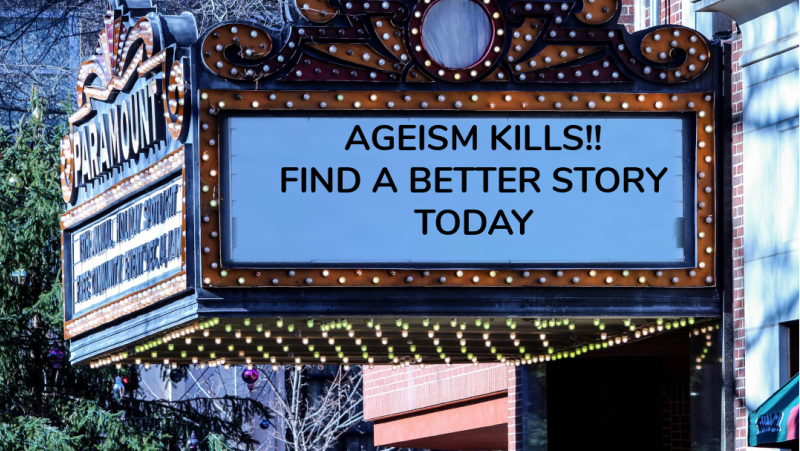
What if there were a remedy available that could extend your life by more than seven years?
And be even better for your health than exercise or eating gallons of kale. And might decrease your chances of dementia.
I bet you’d be interested. You might even pay a lot for it.
But it’s not for sale. It’s FREE and available to you today. (And big pharma won’t make a dime.)
That simple remedy is having a good attitude about aging.
A research-backed remedy
The remedy might sound like wishful thinking. In fact, it’s based on solid research. Data from studies done around the world support the premise that having positive age stereotypes (aka the words that come to you when you think “aging” or “old person”) has a proven effect on well-being.

This is no flash-in-the-pan finding. Dr. Becca Levy, author of Breaking the Age Code: How Your Beliefs About Aging Determine How Long and Well You Live, has spent decades studying the impact of age stereotypes on longevity and health. Over twenty years ago, she analyzed data from the Ohio Longitudinal Study on Aging to show that “participants with the most positive views of aging were living, on average, seven and a half years longer than those with the most negative views.”
And also that:
“Age beliefs were determining their life spans above and beyond the influence of gender, race, socioeconomic status, age, loneliness, and health.” They conferred an “even better survival advantage than low cholesterol or low blood pressure, low body mass index or avoiding smoking.”
If doctors found a medical cure with these kinds of results, it would be a commercial blockbuster, leading to a rash of programs implementing the remedy and remediating exposure to poor age stereotypes.
Unfortunately, it’s not easy to implement this cure. It requires confronting a gross problem in our culture: the “socially sanctioned denigration of the aged.”
Levy writes: “A comprehensive remedy requires that the denigrating views and actions against elderly targets undergo delegitimization by the same society that has generated them.”
Or, to put it bluntly, ageism has to go. It hurts ALL of us and can chop years off our lives.
I want to see a bumper sticker “Ageism kills.”
I’m not going to try, today, to describe all the ways ageism manifests in our society. But, think of it like a pandemic: we’ve all been exposed and are likely infected, and it’s going to take a lot of effort to reach herd immunity.

If you’re saying, “Who me, ageist?” I say “Yes, you,” based on my experience discovering ways in which I’m ageist. I remember, at age 56, walking into my first island Garden Club meeting and seeing seventy women gathered around tables talking. My first thought? “My goodness, there’s a lot of gray hair here.” In my mind, that wasn’t a plus. And the not-really-funny funniest part? I was coloring my hair to cover my own gray!
Learning about these fabulous women helped me shift my attitude and put me on notice that we all carry the ageism gene because it’s dominant in our culture.
(If you want to recognize more signs of ageism, visit anti-ageism advocate Ashton Applewhite’s funny but spot-on website Yo, Is This Ageist? Hint: It almost always is.)
It doesn’t have to be this way
Levy began thinking about longevity and aging when she lived in Japan, where elders are respected–and that respect contributes to their longevity. It seems almost unimaginable that some cultures celebrate their elders turning sixty as a special moment that marks their transition into a revered status and honors their wisdom.
The power of positive stereotypes
Levy did her research by tracking people’s responses to “age stereotypes,” the words they used to describe aging. How people thought about aging influenced how long they lived. And what’s more – how they thought about aging when they were younger also influenced how long they lived.
So if you’re young, take note. It’s never too soon to adopt positive age stereotypes.
Fortunately, our brains are malleable. Levy showed how a group of test takers exposed to positive age stereotype words did better on memory tests compared to test takers exposed to negative words.
Doing something as simple as repeating a more positive set of words led to better outcomes.
Warning: we’re all up against a multi-billion dollar advertising industry that promotes (on the whole) negative stereotypes about aging while idealizing youth. Even some of my favorite comedians make jokes about aging and the elderly that make me wince.
Beyond practicing words: shaping your story

Why doesn’t each of us find a story that speaks to us personally about the joy and possibility aging can bring?
The trick is that story has to be real, not pie-in-the-sky. No happy-ever-after-I’m never-going-to-lose-my physical-or-mental-capacities story will impact us at the depth needed to provide us with immunity to ageism.
Your story has to feel real to your mind, body, and soul.
That doesn’t mean a positive story is hard to find. Ask yourself, what gets me out of bed in the morning? What do I look forward to in the future or the next twenty-four hours? What do I love doing and learning and how do I see myself growing for the rest of my life?
Questions like these can lead us to a story that likely includes elements of hope, purpose, growth, creativity, and service. But it doesn’t have to sound “significant” to others. It just has to be positive and real for us.
Investing in that story would probably benefit us more than life insurance and increase our odds of a longer, healthier life. Of course, Levy’s data doesn’t guarantee that holding positive age stereotypes will insure a long life for any one individual. Her research is based on analyzing large populations; that analysis can’t predict individual outcomes. Still, population-based studies have led us to the kind of useful recommendations doctors use to recommend “high cholesterol is bad” and “exercise is good.”

Changing the narrative
We can do more with our stories than promote our individual health. We can share them.
It’s not enough to immunize ourselves against ageism. We need to flush it out of the culture and we can do that by sharing strong, positive counter-narratives.
Besides supporting our personal health, a positive story about aging packs extra benefits. We approach older people with more curiosity, respect, and interest. They are no longer “the other” to be avoided but “a part of me, too.” Connections happen within the community, and life improves for us all.
And on a closing note, because I know this blog is read by some of my favorite octogenarians and nonagenarians:
Please know that you inspire me every day, and I love you very much.










11 Responses
Nice article!
Thanks and nice to hear from you with all of your wisdom on aging!
Sally, I love this post. My father lived to be 101 and recently passed. He worked out six days a week until the very end! His father lived to be 96. I plan on living to at least 110, and doing my creative transformation work in the world at least until I’m 100. Now, in my early 60s, I have to admit to feeling about 22 most days… we are creating an amazing world filled with joy!
Around 12 years ago, the late, beloved spiritual leader Zalman Schachter-Shalomi went around the country conducting marvelous workshops on From Age-ing to Sage-ing. The object was to get seniors energized and proud to claim their rightful place in society. For the movement truly to succeed, however, you also need that society to be trained to be receptive to what its elders have to offer it. Might be time for a two-pronged revival. Thanks for such a thoughtful piece, Sally.
I am currently reading a wonderful book on ageing called “Miles to Go” by the New Zealand nun Pauline O’Regan. It is full of insight, self-knowledge and humour.
I only started reading this book this morning and later in the day I came across you interesting article. Serendipity indeed.
THank you Christa, I’ll check out the book.
Thank yuo Christa!
Thank you Sally for this important writing. I’m elderly now – age 75 – with a few important stories to tell. Yup, I, like you, also have to write another book. Could you create a zoom workshop for us elders to get together and write – and share – and draw out – our stories? Just wondering.
Thanks Heather. Let’s talk about the zoom workshop idea!
Excellent article. Each week I lead senior Walk and Social groups. Each session has multiplied because there is such a need for not only the social element but those nourishing conversations that everyone has to share. they are interested in helping each other. The group comprises of 70, 80 and 90 year old all clever, active and positive. It tickles my heart to see them making friends.
Thanks very much! Your walks sound wonderful!